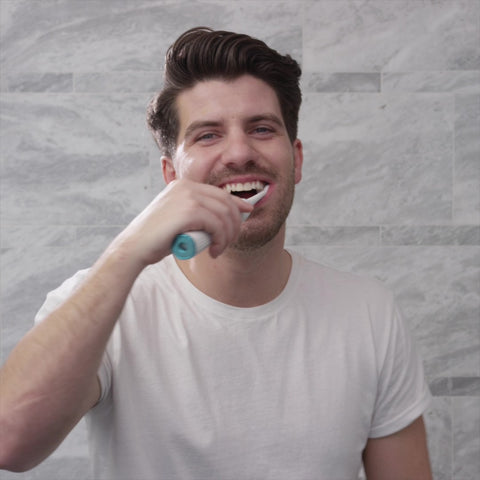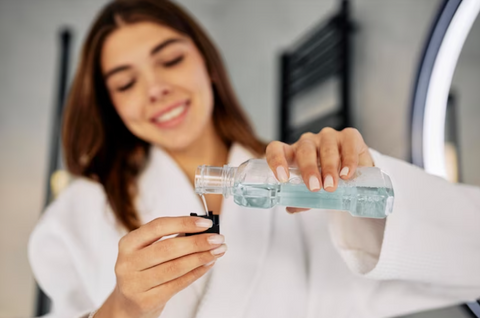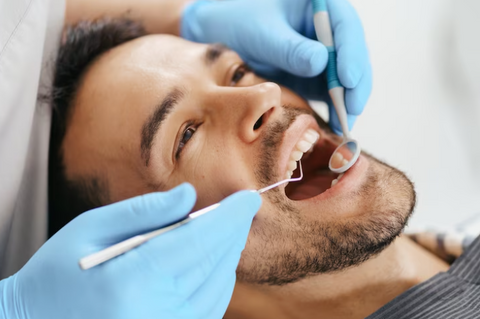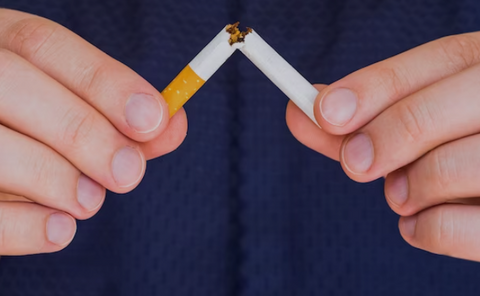10 Strategies for Eliminating Tooth Plaque in 2023
Are you familiar with the sneaky culprit that can wreak havoc in your mouth? It goes by the name of dental plaque, and it's a problem that's been around as long as humans have had teeth.
In this blog, we'll dive into the world of dental plaque, why it's crucial to prevent it, and offer you a treasure trove of 10 tips to keep it at bay in the year 2023.
Definition of dental plaque
Dental plaque, it sounds innocent, right?
Well, don't let the friendly name fool you. Dental plaque is a sticky, colourless film of bacteria that forms on your teeth. Think of it as a tiny, unwelcome party happening in your mouth 24/7.
When you eat, drink, and even breathe, these microscopic party animals feed on the leftover food particles and sugars, throwing a rave that leads to all sorts of trouble.
The importance of preventing dental plaque

Now, why should you care about this dental party crashes?
Because if you don't take measures to prevent it, dental plaque can turn into an uninvited guest that destroys your oral health. Over time, it hardens into a substance called tartar, which can lead to a slew of problems like cavities, decay and gum disease too, and even tooth loss. Not to mention, it's not the best breath companion, either.
The consequences of untreated dental plaque
So, what happens if you let dental plaque run wild, unchecked, and uninvited?
-
Tooth Decay: Dental plaque's acidic antics can lead to tooth decay. Cavities are like little craters in your teeth, and they're not fun to deal with.
-
Gum Disease: If dental plaque sets up camp along your gum line, it can lead to gingivitis (early gum disease) and, if left unattended, progress to periodontists (advanced gum disease). This can result in gum recession, tooth loss, and even systemic health issues.
-
Bad Breath (Halitosis): Dental plaque and the bacteria it harbours can create quite the stench. Bad breath can be a tell tale sign that plaque is having a field day in your mouth.
-
Stains and Discoloration: Plaque can also contribute to teeth staining and discoloration, making your pearly whites not-so-pearly anymore.
The 10 Tips for Preventing Tooth Plaque Formation
Tip 1: Maintain Proper Oral Hygiene

1. Brushing techniques
-
Brush twice a day for two minutes using a sonic electric toothbrush, using slow gentle circular motions.
-
Angle your brush at 45 degrees to clean where teeth meet gums.
2. Flossing techniques
-
Floss daily up between your teeth to clear out plaque lurking under your gums.
-
Use about 18 inches of dental floss for a superhero-level clean.
-
Don't fret if your gums bleed initially; they'll toughen up with time.
3. Choosing the right toothbrush
-
Electric sonic toothbrushes are the modern-day plaque defeating power tool.
-
Replace your toothbrush head every 3 months for maximum effectiveness.
Tip 2: Use Mouthwash and Dental Rinses
1. Benefits of mouthwash
Mouthwash isn't just a minty refresher; it's a powerful ally in the battle against dental plaque. Here's why:
-
Kills Bacteria: Mouthwash contains antimicrobial agents that zap those pesky plaque-causing bacteria.
-
Freshens Breath: Say goodbye to dragon breath; mouthwash leaves your mouth smelling minty fresh.
-
Reaches Nooks and Crannies: It can reach places your toothbrush and floss might miss, making it a comprehensive cleaner.
-
Strengthens Enamel: Some mouthwashes contain fluoride, which fortifies your tooth enamel against plaque's acid attacks.
2. Types of mouthwash for plaque prevention
-
Antiseptic Mouthwash: This variety is excellent for killing bacteria and reducing plaque. Look for one with the Australian Dental Association (ADA) Seal of Acceptance.
-
Fluoride Mouthwash: Ideal for strengthening enamel and preventing cavities. Again, check for the ADA Seal of Acceptance.
-
Prescription Mouthwash: If your dentist prescribes one, it's likely to target specific issues, like severe plaque build-up or gum disease.
3. Proper usage of mouthwash

-
Read the Label: Follow the instructions on the bottle carefully, as different mouthwashes have different usage guidelines.
-
Timing is Key: Swish it around your mouth for the recommended time (usually 30 seconds to 1 minute), then spit it out. Don't swallow it!
-
Don't Rinse After: Avoid rinsing your mouth with water immediately after using mouthwash; you want those active ingredients to keep working.
"Also read - The Science of Fresh Breath Sprays"
Tip 3: Watch Your Diet

1. Foods that promote plaque formation
-
Sugary Treats: Candy, cookies, cakes, and sugary drinks are like a red carpet for plaque-forming bacteria. They love to feast on sugar.
-
Starchy Delights: Foods like chips, crackers, and white bread break down into sugars in your mouth, providing a buffet for plaque.
-
Acidic Fare: Citrus fruits and acidic beverages like soda can erode tooth enamel, making it easier for plaque to stick around.
2. Foods that help prevent plaque
-
Crunchy Veggies: Foods like carrots, celery, and cucumbers act as natural toothbrushes, scraping away plaque as you chew.
-
Dairy Delights: Cheese, milk, and yoghurt are rich in calcium and phosphates, which help remineralize enamel and fight plaque.
-
Green Tea: This antioxidant-rich beverage can inhibit plaque growth and reduce bacteria in your mouth.
3. The role of sugar and carbohydrates
-
Moderation: Enjoy sugary treats in moderation and save them for special occasions.
-
Timing: It's better to have sweets with meals than as snacks. Saliva production during meals helps neutralise acids.
-
Rinse or Chew Gum: If you indulge in something sugary, rinse your mouth with water or chew sugar-free gum afterwards to help remove residual sugars.
Tip 4: Limit Acidic Beverages
1. The impact of acidic drinks on tooth enamel
-
Erosion: Acidic beverages like citrus juices, sodas, and sports drinks can erode your tooth enamel, making it weaker and more susceptible to plaque attacks.
-
Tooth Sensitivity: Enamel erosion can lead to increased tooth sensitivity, making hot or cold foods and drinks uncomfortable.
-
Tooth Discoloration: Acidic drinks can cause teeth to become discoloured, turning them yellow or even grey over time.
2. Alternatives to acidic beverages
-
Water: H2O is the MVP of oral health. It's not only essential for overall well-being but also helps rinse away food particles and acids.
-
Milk: It's not just good for bones; it's good for teeth too. Milk contains calcium and phosphates, which strengthen enamel.
-
Herbal Tea: Opt for caffeine-free herbal teas like chamomile or mint. They're low in acid and can even have added benefits for your oral health.
-
Sparkling Water: If you crave the fizz, go for plain or lightly flavoured sparkling water without added sugars or acids.
Tip 5: Stay Hydrated with Water

1. Water's role in preventing plaque build-up
-
Rinse Away Debris: When you drink water, it washes away food particles and residual sugars that plaque bacteria adore.
-
Maintains Saliva Flow: Saliva is your mouth's natural defence against plaque. It contains minerals that help remineralize enamel and neutralise acids.
-
Keeps Mouth Hydrated: A well-hydrated mouth is less prone to dryness, which can encourage plaque formation.
Tip 6: Chew Sugar-Free Gum
1. How sugar-free gum helps prevent plaque
-
Stimulates Saliva Production: Chewing gum, especially sugar-free varieties, stimulates the production of saliva. Saliva is nature's mouthwash; it helps wash away food particles, neutralise acids, and remineralize enamel.
-
Disrupts Plaque Formation: The act of chewing gum disrupts the formation of dental plaque by physically removing debris and plaque-causing bacteria from your teeth and gums.
-
Freshens Breath: Sugar-free gum can provide a quick breath refresher, masking any unpleasant odours.
Tip 7: Regular Dental Checkups
1. Importance of professional dental cleanings
-
Thorough Cleaning: Even with the most diligent home care, dental plaque can still sneak into hard-to-reach places. A dental professional have the tools and expertise to remove plaque and tartar build-up effectively.
-
Early Detection: Dentists can spot potential issues in their early stages, from cavities to gum disease. Addressing these problems early can prevent them from escalating into more severe, costly conditions.
-
Customised Advice: Your dentist can provide personalised advice on your oral care routine and recommend specific products or techniques tailored to your needs.

2. How often to schedule dental check-ups
-
Every Six Months: For most people, visiting the dentist every six months is the standard recommendation. This schedule allows for early detection and proactive care.
Tip 8: Consider Dental Sealants
1. What are dental sealants?
Dental sealants are like invisible shields for your teeth, made from a safe, plastic-like material. They are applied to the chewing surfaces of your back teeth (molars and premolars). These are the areas where dental plaque loves to hide because their uneven surfaces make them harder to clean with just brushing and flossing.
2. Candidates for dental sealants
-
Children and Adolescents: Kids and teenagers are prime candidates for sealants because they're still learning optimal oral hygiene habits.
-
Adults: If you have deep grooves or pits in your molars and premolars and haven't had sealants applied before, it's not too late. Adults can also benefit from sealants to prevent plaque build-up.
Tip 9: Quit Smoking and Tobacco Products

1. The link between tobacco use and dental plaque
-
Increased Plaque Formation: Tobacco use creates the perfect environment for plaque to thrive. It reduces blood flow to the gums, impairs your immune system's response, and promotes bacterial growth.
-
Gum Disease: Smokers are more likely to develop gum disease, which can lead to tooth loss and other serious health problems.
-
Tooth Discoloration: Tobacco stains your teeth, making them appear yellow or brown.
-
Bad Breath: Smoking and tobacco products contribute to bad breath (halitosis).
"Also read - Smoking & Oral Health: What You Need to Know"
Tip 10: Manage Stress
1. The connection between stress and oral health
-
Grinding and Clenching: Stress often leads to teeth grinding (bruxism) and jaw clenching. This can wear down your enamel and lead to dental problems.
-
Neglecting Oral Care: When stress overwhelms you, oral hygiene routines like brushing and flossing may take a backseat, allowing dental plaque to flourish.
-
Gum Disease: Chronic stress weakens your immune system, making you more susceptible to gum disease and slower to recover from it.
2. Stress management techniques
-
Regular Exercise: Physical activity releases endorphins, which are natural stress busters. It also promotes better sleep, which can reduce stress.
-
Meditation and Relaxation: Mindfulness meditation, yoga, or simply setting aside time to relax can help lower stress levels.
-
Deep Breathing: Practice deep breathing exercises to calm your mind and reduce stress in the moment.
-
Healthy Lifestyle Choices: A balanced diet and adequate sleep can go a long way in managing stress.
-
Seek Support: Don't hesitate to talk to friends, family, or a mental health professional if you're struggling with stress.
"Also read - 5 Worst Ways Stress Harms Your Oral Health"
Additional Tips and Tricks
-
Natural Remedies: Natural remedies like baking soda toothpaste, oil pulling, and tea tree oil mouthwash can complement your regular oral hygiene routine in preventing plaque. However, consult your dentist before relying solely on these remedies.
-
Probiotics: Probiotics, known for gut health, also play a role in oral health by maintaining a balanced mouth microbiome. Consider probiotic-rich dairy products or oral health supplements after consulting a professional.
-
Tongue Cleaning: Don't forget your tongue! Use a tongue scraper or the back of your toothbrush to gently remove bacteria and debris daily, enhancing your oral hygiene.
-
Electric Toothbrushes: Electric toothbrushes offer effective, consistent plaque removal with features like rotating bristles and timers. They can be a valuable tool to improve your plaque prevention routine.
Conclusion
In 2023, preventing dental plaque isn't just about a pretty smile; it's essential for overall oral health. Here's the quick guide:
-
Oral Hygiene: Brush and floss correctly, choose the right tools.
-
Mouthwash: Use it daily, watch out for acidic drinks, and stay hydrated.
-
Sugar-Free Gum: Chewing is helpful.
-
Dental Check-ups: Regular visits are a must.
-
Quit Tobacco: It's crucial for your oral health.
-
Stress Management: Keep your mind and smile healthy.
-
Natural Remedies: Explore some, consider probiotics.
-
Tongue Care: Don't forget it.
-
Electric Toothbrushes: They can be a game-changer.
Follow these, and you'll enjoy a plaque-free smile and lasting oral health in 2023 and beyond!
Frequently Asked Questions -
1 - What are some of the best tips to practice good oral hygiene?
Some of the best ways to practice good oral hygiene is by brushing twice a day using fluoride toothpaste and floss daily.
2 - What is a good oral health?
Good oral health encompasses having healthy teeth, gums, and an overall healthy mouth, without issues like cavities, gum disease, or discomfort.
3 - How dental plaque forms?
Dental plaque forms when bacteria in your mouth combine with food particles and saliva, forming a sticky film on teeth. Over time, if not removed through regular brushing and flossing, it can harden into tartar and lead to dental problems.
4 - What is an oral cavity? How it is different from dental plaque?
The oral cavity is your mouth, including your teeth, gums, and the entire space inside. Dental plaque, on the other hand, is a soft, sticky biofilm that forms on teeth due to bacterial activity and the accumulation of food particles. It is a specific issue within the broader context of oral health.


